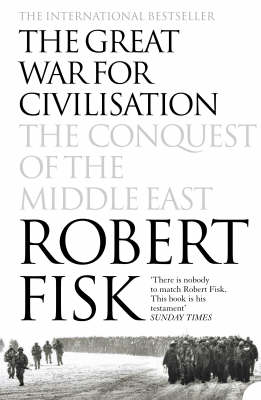
What an enormous, sprawling, wide-ranging, dense, tragic, magisterial narrative has Robert Fisk spun out of his journalistic experiences. I have read Edward Said’s works on the Middle East, Huntigndon’s “Clash of Civilizations,” and passed through many histories of that troubled part of the world, but it is my considered opinion that this outcome of thirty years’ reporting there is in a class by itself. Personal, compelling, well-researched and passionately written, it is on a par with “Bury My Heart at Wounded Knee” for unbridled emotional and intellectual impact.
Fisk’s writing is a tour of the modern history of the middle east (although he digresses to other points from time to time). He writes about his interviews with Osama bin Laden, the Armenian genocide (it was the Congressional recognition of this in 2010 that made me go back to the book), the Algerian civil war, and 20th century histories of Iraq, Iran, Palestine, Saudi Arabia and Kuwait. Through it all you get the sense of his outrage at how, as the British Empire waned and shrank and the American one rose, whole populations were manipulated, used, killed and moved as pawns across a strategic board, with fear and hysteria as coercive weapons. Nowhere is this more clear than in the account of the Iraqi invasion and how, by deliberately manipulated intelligence and populations whipped into war frenzies of hatred and revenge, the Western Powers commandeered the oil in Iraq, and labelled anyone who disagreed as being on the side of the “terrorists.”
This brief account of the book does little justice to the sweeping arc of Fisk’s accounts of the Middle East. Yes it’s a weighty read, and yes, it’s long – a book covering this much history can hardly be anything else. But his personalized writing style and in-place observations of the events that shaped the region for over a century are a valuable counterpoint to the drier historical tomes written by more erudite historians, and there’s no denying is research, or his passion for the innocent dead. Indeed, it is these accounts that inflate the book (a fact bemoaned by many). Fisks acts as a speaker for the dead, presuming to ask why. And if he writes stridently and with too many words, I can only recall the Emperor’s whine to Mozart about too many notes. And Mozart’s reply…”Which ones should I cut?”
I reiterate that if history is not your thing, this book won’t do much for you. But as year passes year and we are no closer to a Middle East peace, and nations continue to go to war in that region, then perhaps a book like this, unashamedly partisan and mourning the waste, is in itself, perhaps, a good thing to take hold of and read through, if only just once.